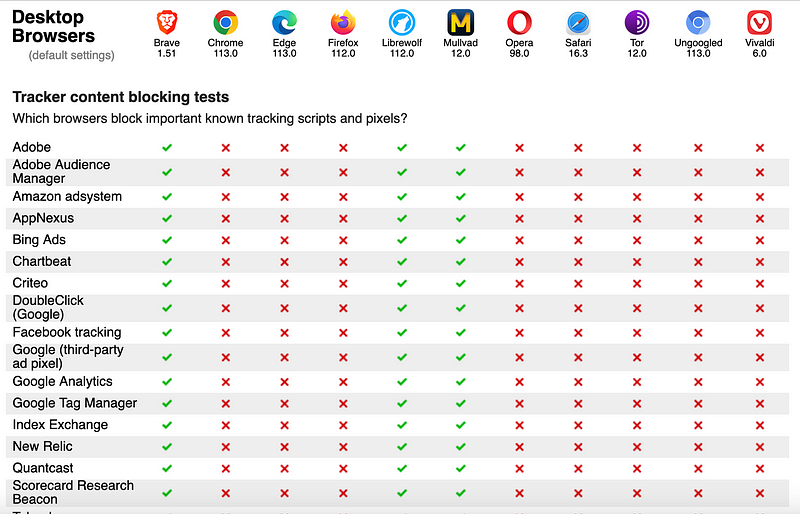How Private Is Your Browser?

How Private Is Your Browser?
If you want Privacy, Don’t Use Edge, Opera or Chrome … Use Librewolf, Mullvad, Brave or Tor
We love our browsers, but do they leak sensitive information? Unfortunately, they can be a source of data collection for many companies, and the leakage of information can allow them to target you. A simple tracking cooking install (with you accepting the conditions of the site), can be used to track your activity across different websites. And, those pesky advertisements are typically focused on you, as tracking activities pinpoint the kind of things you like. Well to assess this, PrivacyTests.org [here] has a whole host of tests which assess how good our browsers are with privacy.
Browser market share
Chrome, currently, has by far the largest share of the market (with 63.45%). Its nearest contenders are Safari (20.48%), Edge (4.97%), Firefox (2.97%), and Opera (2.4%). Safari gains its popularity due to the sale of Apple computers — and which also have around 20% of the market share for computer sales. And, so, for Windows-based computers, Chrome has a massive share of the browser market. But, is it made for privacy, or does its popularity leave it open to data harvesting?

State partitioning test
The first test is to understand how much information that your browser shares between different websites. This will typically happen with a tracking cookie or through caches of content. As we see in Figure 2, Edge 113.0, Opera 98.0 and Chrome 113.0 do particularly badly in this respect, and generally fail every test in this area. Brave 1.51, Safari 16.3, Firefox 112.0, and Tor 12.0 come out the best.


- Winners (+3): Brave, Firefox, Librewolf, Mullvad, Safari, Tor.
- Contenders (+1): Ungoogled, Vivaldi.
- Losers (0): Chrome, Edge, Opera.
Navigation and HTTPs tests
When it comes to navigation test (Figure 3), the assessment focuses on how well the browser copes with tracking methods for network connections. For example, the document.referrer is a header request which allows a newly visited site to determine where the user came from. All the browsers failed this test, though. Overall, Edge, Chrome and Opera all do poorly with the navigation tests, but Brave, Firefox and Tor do much better.
For HTTPs tests (Figure 3), we see how well the browser copes with HTTPs methods for seeking private information. For the Insecure website test, a browser must stop loading an HTTP site and only allow HTTPs. Chome did less well in this test, but Tor, Librewolf and Mullvad all did well.

- Winners (+3): Tor, Mullvad, Librewolf.
- Contenders (+1): Brave, Ungoogled, Safari, Firefox.
- Losers (0): Edge, Chrome, Opera, Vivaldi.
Advert blocking
An important test involves the blocking of adverts. These can be annoying and can be used to track user access with targetted adverts. In this test, Brave, Librewolf and Mullvad score perfectly, and the rest fail.

- Winners (+3): Brave, Librewolf and Mullvad
- Losers (0): Tor, Brave, Ungoogled, Safari, Firefox, Edge, Chrome, Opera, Vivaldi.
Cookie tracking
An important area of privacy relates to cookie tracking, and where companies can track your activity. Figure 5 shows the Chrome and Opera do badly in this area.

- Winners (+3): Brave, Firefox, Librewolf, Mullvad, Safari, Tor, Ungoogled.
- Contenders (+1): Edge.
- Losers (0): Chrome, Opera, Vivaldi.
Final scoring
And, so, which are the best browsers for privacy? Well, the best are Librewolf, Mullvad, Brave and Tor. Firefox, Safari and Ungoogled are reasonable. Finally, Edge, Vivaldi, Chrome, and Opera are terrible!

Conclusion
Chrome and Safari have most of the market share for browsers, with Chrome having a massive share. But, is it made for privacy, or does its popularity leave it open to data harvesting? The answer is that Chrome is extremely poor for privacy, and failed all of the tests. For the best browsers, it is Librewolf and Mullvad, closely followed by Brave and Tor. Firefox and Safari generally did okay.
Edge, Chrome and Opera are terrible for privacy and leave you open for your data to be harvested. They allow tracking cookies and adverts and generally give away navigation and network information.
For me, I write this on a Firefox browser, and which did okay. I must admit, I also use Chrome for its great compatibility, and Safari for its ease of use on Apple devices. But, Edge … no way!
